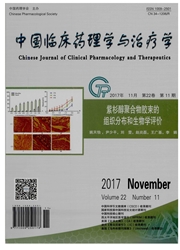

 中文摘要:
中文摘要:
抗氧化剂可以显著降低氧化应激损伤,对缺血性中风具有神经保护作用。然而,抗氧化剂的有效性及副作用问题极大地限制了其临床发展。研究表明,反应氧族(ROS)不仅是缺血性脑损伤的核心因素,而且参与了病后恢复期的组织修复,抗氧化剂的使用障碍可能与ROS复杂的生理作用有关。本文以优化抗氧化剂的使用为目的,阐述缺血性中风后ROS的多重病理生理作用,并对当今抗氧化治疗药物进行综述,通过分析药物运用存在的问题,拟为抗氧化剂基础研究和临床应用提供新的思路。
 英文摘要:
英文摘要:
Antioxidants, which act as neuro- protective agents on ischemic stroke, can signifi- cantly reduce injury caused by oxidative stress. However, their low effectiveness and side effects greatly limit the clinical development. Studies have shown that reactive oxygen species (ROS) is not only the core factor in ischemic brain inju- ry, but also involved in the tissue repair in con- valescence. Therefore, the obstacles of antioxi- dant clinical use may be associated with its com- plex physiological {unctions. The aim of this ar- ticle is trying to find how to optimize the usageof antioxidants. Thereby the multiple physiolog- ical roles of ROS and the antioxidant therapy af- ter ischemic stroke were reviewed. The usage is- sues of antioxidants were analyzed as well. It is supposed to provide new perspective reference for basic research and clinical applications of an- tioxidants.
 同期刊论文项目
同期刊论文项目
 同项目期刊论文
同项目期刊论文
 期刊信息
期刊信息
